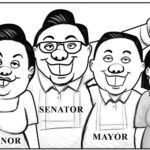Sheilla Ysug
In the Philippines, where family is highly valued and marriage is considered a sacred institution, marriage break-ups and reconciliations are highly stigmatized. However, statistics suggest that the country has one of the highest divorce rates in Asia, with an estimated 30% of marriages ending in divorce. This trend is attributed to various factors, including economic struggles, conflict, and cultural differences between spouses.
Tradition vs. Modernity
Philippine society is known for its strong traditional values, where family and community play a crucial role in shaping individual decisions. Marriage is often seen as a lifelong commitment, and divorce is generally viewed as a last resort. However, with increasing globalization and exposure to Western culture, some Filipinos are adopting more modern views on marriage and relationships.
Cultural Pressures
In Filipino culture, family is typically conceived as a source of support, security, and identity. Marital problems are often viewed as a personal failure, and divorced individuals may struggle to reintegrate back into their communities. The relatives of the couple may also exert pressure to reconcile, citing the importance of preserving the family’s reputation.
Consequences of Break-ups
Marriage break-ups can have severe consequences for both partners and their families. Women, in particular, may face significant challenges, as they are often expected to prioritize their role as caregivers and homemakers. Without a husband’s financial support, women may struggle to maintain a decent standard of living, let alone care for their children. In some cases, women may even experience physical or emotional abuse as a result of a break-up.
Reconciliation Efforts
Despite the stigma surrounding divorce, many couples in the Philippines attempt to reconcile. This decision is often motivated by a desire to preserve the family’s reputation, minimize public embarrassment, and provide a sense of security and stability for their children.
Reconciliation efforts can take various forms, including counseling, communication therapy, and mediation. In some cases, couples may seek help from religious leaders, family members, or friends to work through their issues. However, reconciliation is often a challenging and emotional process, requiring both partners to be willing to listen, forgive, and work together.
Challenges and Opportunities
While reconciliation efforts can be successful, there are challenges and opportunities to consider:
- Power imbalances: In traditional Filipino culture, men are often seen as the heads of households and decision-makers. This power differential can make it difficult for women to assert their needs and boundaries during the reconciliation process.
- Stigma and shame: The stigma surrounding divorce and unmarried cohabitation can lead to feelings of shame and guilt, making it difficult for individuals to openly discuss their relationship issues.
- Lack of support: Limited access to resources, such as counseling and legal assistance, can hinder the reconciliation process.
- Family involvement: While family support is often crucial for reconciliation, excessive involvement can also create conflict and hinder the couple’s ability to work through their issues together.
Opportunities for improvement include:
- Increased access to counseling and therapy services
- Greater awareness and discussion of relationship issues and divorce
- More inclusive and gender-sensitive reconciliation processes
- Support for solo parenting and independence
Conclusion
Marriage break-ups and reconciliations in the Philippines are influenced by cultural values, family pressures, and societal norms. While stigma and shame continue to surround divorce, there is a growing recognition of the need for more open and honest discussions about relationship issues. As the country grapples with the complexities of modern relationships, it is essential to prioritize support for individuals, couples, and families, recognizing the importance of healing, growth, and well-being.















